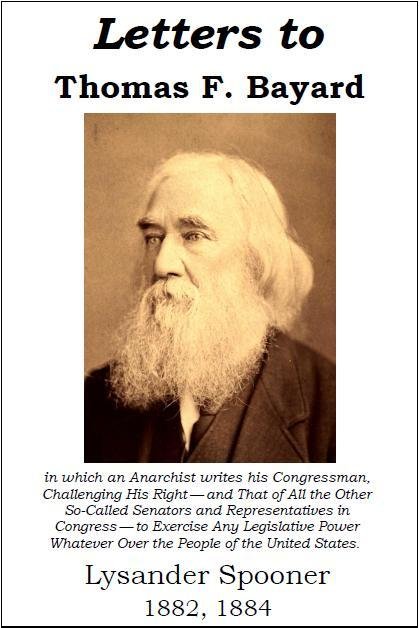C4SS has teamed up with the Distro of the Libertarian Left. The Distro produces and distribute zines and booklets on anarchism, market anarchist theory, counter-economics, and other movements for liberation. For every copy of Lysander Spooner’s “Letters to Thomas F. Bayard” that you purchase through the Distro, C4SS will receive a percentage. Support C4SS with Lysander Spooner’s “Letters to Thomas F. Bayard“.
$2.00 for the first copy. $1.00 for every additional copy.
Lysander Spooner’s first and second letters to Congressman Thomas F. Bayard (D-DE) challenge all government with the standard of natural law and natural liberty. Spooner’s work was widely circulated and admired among the individualist anarchists in the late 19th and early 20th century. Later, the first letter to Bayard was widely reprinted and became incredibly influential in the intellectual revival of individualist anarchism during the 1960s. Whereas the first Letter to Bayard is one of Spooner’s best known works, the Second Letter to Bayard is a lost treasure recovered from the archives, until now very difficult to find in print. Together, they are one of Spooner’s sharpest attacks on the usurpation of legislators and the fraud of the legal Constitutions that are supposed to authorize, and yet somehow also limit, the arbitrary dominion of the State and the men who control it.
No man can delegate, or give to another, any right of arbitrary dominion over himself; for that would be giving himself away as a slave. And this no one can do. Any contract to do so is necessarily an absurd one, and has no validity. To call such a contract a “Constitution,” or by any other high-sounding name, does not alter its character as an absurd and void contract. No man can delegate, or give to another, any right of arbitrary dominion over a third person; for that would imply a right in the first person, not only to make the third person his slave, but also a right to dispose of him as a slave to still other persons. Any contract to do this is necessarily a criminal one and therefore invalid. To call such a contract a “Constitution” does not at all lessen its criminality, or add to its validity…
All this pretended delegation of legislative power — that is, of a power, on the part of the legislators, so-called, to make any laws of their own device, distinct from the law of nature — is therefore an entire falsehood; a falsehood whose only purpose is to cover and hide a pure usurpation, by one body of men, of arbitrary dominion over other men….








